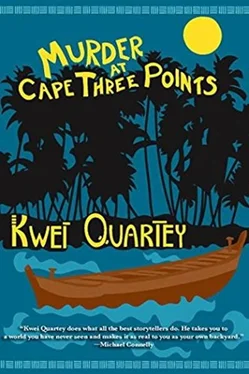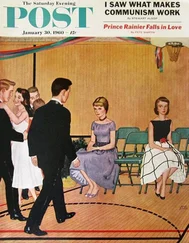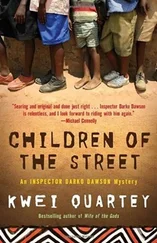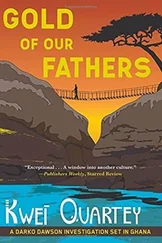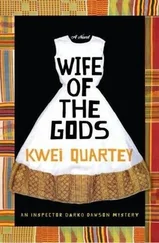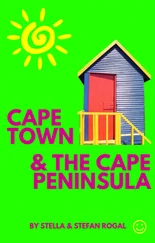“This is the life,” Christine said. “I could live here.”
“Me too,” Akosua said.
“Fine,” Abraham cracked. “When we depart, we’ll leave you ladies both behind.”
“Hmm,” Akosua said. “Who’s going to cook for you?”
A white man in shorts and slippers approached them at a leisurely pace. He was of average height with a rotund belly, a fiery head of red hair, and a hircine beard streaked with grey.
“Mr. Cardiman?”
“Yes, and you must be Inspector Dawson. Welcome, sir!”
His voice resembled paper clips rattling in a tin, which suggested to Dawson a man who enjoyed an unfettered, somewhat jumbled life.
“This is a beautiful place,” Dawson said as he shook hands.
He introduced Chikata, the three other adults, and the two boys. Cardiman bent forward and playfully rubbed their heads.
“I’m sure you lads can’t wait to get into the water, eh?”
“You are reading their minds correctly,” Dawson said.
“Well, it’s low tide and will remain so for a few hours yet,” Cardiman said jovially, “so it’s a perfect time to go in.”
“My cousin can go in with them while we talk,” Dawson said.
“Come on, boys,” Abraham said. “Let’s go and change.”
Sly and Hosiah raced off excitedly in front of their uncle.
“Shall we go to my office, gentlemen?” Cardiman said to Dawson and Chikata.
“See you ladies later,” Dawson said.
Lazing in the lounge chairs, neither woman was paying much attention to him.
A ROOM IN Cardiman’s house served as the office. His desk, a muddle of papers crowding out two laptops, confirmed Dawson’s first impressions: the man was a little scattered, but happy with it. Facing Cardiman, Dawson and Chikata sat down in a pair of cushioned chairs along the wall. A pleasant cross breeze passed through the two mosquito-screened windows.
“I know you are anxious to talk about the Smith-Aidoo murders, Inspector,” Cardiman said.
“Did you know them well?”
“I knew Charles as well as I wanted to, but I met his wife only once, and that was when they visited me here at Ezile on that fateful Monday.”
“What was the purpose of their visit?”
“Whenever Charles Smith-Aidoo was here,” Cardiman said, leaning back and resting his hands on the promontory of his belly, “it was to talk to Akwidaa’s chief, Nana Ackah-Yensu; myself; or both. Charles had a vision in which the two bays formed by the three peninsulas-the three points, so to speak-could become residential areas. Housing for low and mid-level workers in the oil industry would start some distance back from the beach and be built progressively inward. Luxurious chalets and mansions for rich people would be right on the beach.”
Distress now passed across Cardiman’s face like a shadow. “Have you seen the majesty of this place? A swampland with superb mangroves is just a short walking distance from here. Akwidaa is on the east side of the bay, and beyond that, you’ll find the ruins of an ancient German fort. Later on, I’d like to show you the bay on the other side of mangroves-simply lovely. Unparalleled forest and wildlife thrive along the three peninsulas for which Cape Three Points is named. The oil companies are already destroying marine life and habitat, and now they want to add land to their conquests and get rid of Ezile Bay Resort. Over my dead body.”
Or Smith-Aidoo’s , Dawson thought. “I read the minutes of the meetings you attended at the STMA. You strongly oppose the oil people.”
“What happens when multinational companies invade a developing country like Ghana to set up extractive industries like gold or diamonds, or oil?” Cardiman demanded, thrusting his hands out. “They ruin the country, that’s what happens, Inspector. We all know about the chaos in the Niger Delta, where oil spills occur practically every day.”
“Has there been an oil spill off Ghana’s shores?” Chikata asked, and Dawson thought it was an excellent question.
“We had one just six months ago, and yet no one said a word,” Cardiman said, folding his arms in indignation. “Not one word, gentlemen. No government announcement, nothing in the papers, and precious little on the radio. Can you imagine that?”
“How did you hear about it?” Dawson asked.
“I know one of the Malgam helicopter pilots who takes workers to and from the rig. He saw the sheen over the water surface. It obviously wasn’t a large spill, but it was a spill just the same. I’m convinced that there’s been more than one but I believe that there’s been a hush imposed on the media. Fish populations are down, whales have been washing up dead on Western Region beaches-”
“Whales?” Dawson said in surprise. “Ghana has whales?”
“Oh, yes!” Cardiman exclaimed with a smile. “And dolphins and endangered giant sea turtles. They didn’t teach you all that in school, did they?”
“No,” Dawson said. “Although it’s possible I slept through that class.”
Cardiman laughed, the stern expression on his face softening a bit.
“Let’s say a very large spill occurs,” Dawson said, “who pays for it?”
“Malgam will pay for the cleanup, but that’s as far as they’re obligated.”
“They wouldn’t be fined?”
“No,” Cardiman said, shaking his head with vigor. “Even worse, they don’t pay restitution to fishing communities should their livelihoods be adversely affected. They can get away with murder, and that’s not an exaggeration.”
“And whose fault is that?” Dawson asked.
“Our government’s, that’s who!” Cardiman said, as if it should have been obvious. “A pusillanimous bunch who can’t stand up to these multinationals or resist the money that gets deposited in their Swiss bank accounts, not to mention the all-expenses-paid jaunts to Europe.”
“You’re saying gifts in exchange for keeping regulations at a minimum,” Dawson said.
“Do you think this lack of oversight of the oil companies is accidental?” Cardiman asked heatedly. “Don’t believe it for a moment.”
Dawson wondered if the man was being over-cynical, but he didn’t know enough to challenge him.
“Where did Charles Smith-Aidoo fit into all of this?” he asked.
“Here’s the problem,” Cardiman said with authority. “Charles served two masters-Malgam Oil, and himself, and sometimes it was a conflict of interest. His duties to Malgam included presenting the best face of the company to outside agencies, and to the public. However, at the same time he was setting up moneymaking ventures for personal gain. So, for instance, while he’s representing Malgam in their PR move to rebuild Akwidaa, he gets the bright idea that Akwidaa should trade their beachfront property in return for electricity and running water at another location, and he’s thinking about what’s in it for him and his developer friend.”
“What developer friend?”
“Peter Duodo. Savvy man-owns Duodo Enterprises in Accra. It’s in the Price-Waterhouse Building near Kotoka Airport.” Cardiman seemed to relish supplying information. “The two of them had some kind of informal scratch-my-back-I’ll-scratch-yours arrangement.”
“I see.” Dawson was thinking about all Cardiman had said so far. “Do you think Malgam would really finance the relocation of an entire village?”
“Let me tell you exactly how it would go,” Cardiman said knowingly. “Malgam officially collaborates with the government on the project to move the village back from the beach while allowing them access to the sea via the Ezile River and the lagoon. Malgam promises a certain amount of money to support pipe-borne water and electrification, on the condition that the government completes the housing. That’s because Malgam isn’t stupid, and the crafty devils know that the government will start the buildings, partially complete them, the village people will move in, and the Ministry of Interior will maybe put in a community tap at most, with promises of electricity to come. The MP gets a little pocket money from Malgam in return for the project dragging or coming to a complete stop.”
Читать дальше
